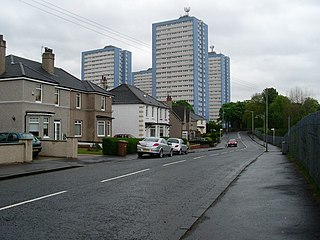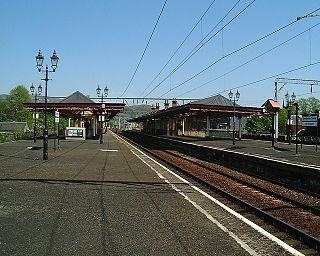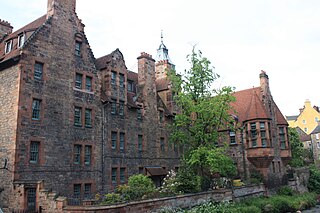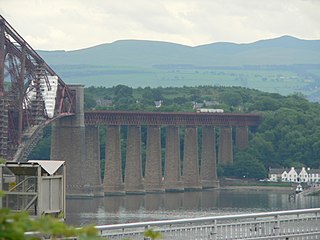


William Spence (1806 - 22 June 1883) was an architect based in Glasgow. [1]



William Spence (1806 - 22 June 1883) was an architect based in Glasgow. [1]
He was born in 1806 at Carstairs, the second son of John Spence (1775-1849) (shoemaker) and Margaret Kane (1778-1820). [2] He married Margaret Field (1824-1879) on 12 December 1843 at Barony, Lanark and they had five children:
He died on 22 June 1883 [3] at Helensburgh, Argyll and Bute.
He trained in the offices of William Burn and David Bryce with John Bryce before establishing his own practice around 1837. Around 1839 he was based at 34 Glassford Street in Glasgow. By 1844 he had moved to 141 Buchanan Street, Glasgow, but by 1852 he was in business at 97 Union Street. In 1860 he settled at 52 Renfield Street, Glasgow.
In 1857 he was commissioned for a feuing plan to develop the upper areas of Helensburgh. [4]
His wife Margaret died in 1879 [5] and this may have prompted him to retire at the end of the same year. His son Henry continued the practice.

Dunbartonshire or the County of Dumbarton is a historic county, lieutenancy area and registration county in the west central Lowlands of Scotland lying to the north of the River Clyde. Dunbartonshire borders Perthshire to the north, Stirlingshire to the east, Lanarkshire and Renfrewshire to the south, and Argyllshire to the west. The boundaries with Lanarkshire and Stirlingshire are split in two owing to the existence of an exclave around Cumbernauld.

Helensburgh is an affluent coastal town in Argyll and Bute council area, Scotland, sitting at the intersection of the Firth of Clyde, East Clyde and the Gareloch. It has its own Community Council. Until local government reorganisation in 1996, Helensburgh was in Dumbarton District and Strathclyde Region; prior to 1975 it was a small burgh with its own town council within Dunbartonshire.

Sir Basil Urwin Spence, was a Scottish architect, most notably associated with Coventry Cathedral in England and the Beehive in New Zealand, but also responsible for numerous other buildings in the Modernist/Brutalist style.

Baillieston is a suburb of Glasgow, Scotland. It is about 7 miles (11 km) east of the city centre.

The McLellan Galleries are an exhibition space in the city of Glasgow, Scotland, situated behind a frontage of shops in Sauchiehall Street.

Bridgeton is a district to the east of Glasgow city centre. Historically part of Lanarkshire, it is bounded by Glasgow Green to the west, Dalmarnock to the east and south, Calton to the north-west at Abercromby Street/London Road and Gallowgate to the north-east.

Sandyhills is an area of the Scottish city of Glasgow. It is situated north of the River Clyde and has fallen within the Shettleston ward of Glasgow City Council since 2007.

Strathclyde Police was the territorial police force responsible for the Scottish council areas of Argyll and Bute, City of Glasgow, East Ayrshire, East Dunbartonshire, East Renfrewshire, Inverclyde, North Ayrshire, North Lanarkshire, Renfrewshire, South Ayrshire, South Lanarkshire and West Dunbartonshire between 1975 and 2013. The Police Authority contained members from each of these authorities.

Dumbarton Central railway station serves the town of Dumbarton in West Dunbartonshire, Scotland. This station is on the West Highland Line and the North Clyde Line, 15+3⁄4 miles (25.3 km) northwest of Glasgow Queen Street.

Glasgow Cross is at the hub of the ancient royal burgh and now city of Glasgow, Scotland, close to its first crossing over the River Clyde. As a major junction in the city centre, its five streets run: north up the High Street to Glasgow Cathedral, Cathedral Square and the Royal Infirmary; east along Gallowgate and London Road, close to St Andrew's Square; south on the Saltmarket to Glasgow Green and the High Court; and its own Trongate continuing west as Argyle Street towards St Enoch Square and Buchanan Street.

John Thomas Rochead was a Scottish architect. He is most noteworthy on a national scale for having been the designer of the Wallace Monument.

St. Enoch Square is a large public square in Glasgow, Scotland, situated south of the junction of Buchanan Street and Argyle Street, the two of the city's busiest shopping streets.
The Metropole Theatre started as the Scotia and was built in 1862 at 116, Stockwell Street, Glasgow, Scotland. Built to the designs of architect Robert Black for James Baylis, who later built the Theatre Royal in the Cowcaddens area of the city, it opened as the Scotia Hall, holding over 3000 people, with stalls and two galleries, reputed to be the first purpose built commercial music-hall in Scotland. Due to fire in 1875 it was rebuilt to the designs of architects Campbell Douglas and James Sellars and renamed The Scotia Variety Theatre, claiming to be the largest and best variety company in Scotland.

Arthur George Sydney Mitchell was a Scottish architect. He designed a large number of bank branches, country houses, churches and church halls. His most significant commissions include the housing developments at Well Court and Ramsay Garden, both in Edinburgh.

William Leiper FRIBA RSA (1839–1916) was a Scottish architect notable particularly for his domestic architecture in and around the town of Helensburgh. In addition, he produced a small amount of fine ecclesiastical and commercial architecture in Glasgow and the Scottish Lowlands. He was also an accomplished watercolour artist, and from the late 1870s spent much spare time painting in oils and watercolours.
Charles Jean Ménart was a Belgian architect who worked in Scotland in the early 20th century and specialised in designing Roman Catholic churches in the Baroque Revival style.

Archibald Campbell Douglas was a Scottish architect based primarily in Glasgow. He designed many churches in Glasgow and Edinburgh, especially those for the Free Church of Scotland.

James Carswell (1830–1897) was a Scottish railway engineer largely remembered for his design of glazed roof on Queen Street Station, Glasgow and the huge approaches to the Forth Bridge.

Wellhouse is a residential neighbourhood in the East End of the Scottish city of Glasgow. Since 2007 it has been part of the Baillieston administrative ward within the Glasgow City Council area.
John Hutchison ARIBA (1841–1908) was a 19th-century Scottish architect linked strongly to Paisley.